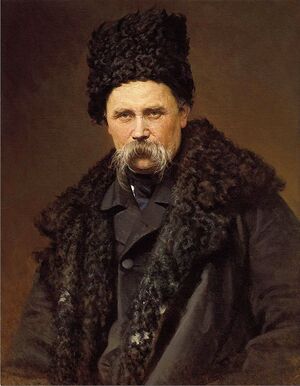William Shakespeare and Taras Shevchenko: Difference between pages
Tchaikovsky Research
(Difference between pages)
m (1 revision imported) |
m (Text replacement - "Kramskoi" to "Kramskoy") |
||
| Line 1: | Line 1: | ||
{{picture|file= | {{picture|file=Taras Shevchenko.jpg|caption='''Taras Shevchenko''' (1814–1861), in a portrait by Ivan Kramskoy}} | ||
Ukrainian poet, writer, artist and ethnographer (b. 25 February/9 March 1814 at Moryntsi; d. 26 February/10 March 1861 in [[Saint Petersburg]]), born '''''Taras Hryhorovych Shevchenko''''' (Тарас Григорович Шевченко); known in Russia as '''''Taras Grigoryevich Shevchenko''''' (Тарас Григорьевич Шевченко). | |||
==Tchaikovsky's Settings of Works by | ==Tchaikovsky's Settings of Works by Shevchenko== | ||
* ''Do Not Leave Me'' (Не отходи от меня), No. 3 of the [[Six Romances and Songs, Op. 27]] (1875), is a setting of Shevchenko's poem ''The Little Cherry-Orchard'' (Садок вишневий коло хати) from his cycle ''In the Casement'' (В каземат) (1847), in a Russian translation by [[Lev Mey]] (1822–1862). | |||
* | * ''In the Garden, By the Ford'' (В огороде, возле броду), No. 4 of the [[Six Duets, Op. 46]] (1880), is a setting of Shevchenko's 1848 poem of the same title (Но вгородi коло броду), in a Russian translation by [[Ivan Surikov]] (1841–1880). | ||
* | |||
==External Links== | ==External Links== | ||
* [[:wikipedia: | * [[:wikipedia:Taras Shevchenko|Wikipedia]] | ||
[[Category:People| | [[Category:People|Shevchenko, Taras]] | ||
[[Category:Writers| | [[Category:Writers|Shevchenko, Taras]] | ||
Revision as of 22:52, 13 February 2019
Ukrainian poet, writer, artist and ethnographer (b. 25 February/9 March 1814 at Moryntsi; d. 26 February/10 March 1861 in Saint Petersburg), born Taras Hryhorovych Shevchenko (Тарас Григорович Шевченко); known in Russia as Taras Grigoryevich Shevchenko (Тарас Григорьевич Шевченко).
Tchaikovsky's Settings of Works by Shevchenko
- Do Not Leave Me (Не отходи от меня), No. 3 of the Six Romances and Songs, Op. 27 (1875), is a setting of Shevchenko's poem The Little Cherry-Orchard (Садок вишневий коло хати) from his cycle In the Casement (В каземат) (1847), in a Russian translation by Lev Mey (1822–1862).
- In the Garden, By the Ford (В огороде, возле броду), No. 4 of the Six Duets, Op. 46 (1880), is a setting of Shevchenko's 1848 poem of the same title (Но вгородi коло броду), in a Russian translation by Ivan Surikov (1841–1880).

